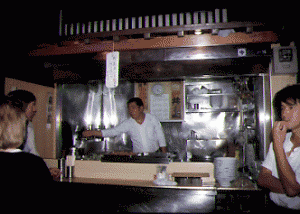Take an Ecotour to Japan
You have been learning about ecotours all over the world, but what do you suppose would make a good ecotour to Japan? What would foreign ecotourists be interested in doing that would be different from the usual tourist attractions? Although the nature sites of Japan are spectacular, travelers would be more likely to come to visit Kyoto, for example, than to hike in a national park forest. Japan is perceived as a “culture tour” destination, although perhaps in the future, more of the incredible diversity of nature in Japan will be greater recognized by foreign travelers.

Ordering at noodle stand near Tokyo Fish Market
Ecotourists coming to Japan are different than general tourists becausethey try to experience more of the local lifestyle. You may be very surprised tofind what “ordinary” facets of everyday life will “fascinate” a tourist to yourown country.
In this month’s forum, we will look at the experiences of a professional ecotour guide Kathryn Levenson, who is the Director of Top Guide Treks and Toursbased in Berkeley, California. She will share the surprising differences andsimilarities between ecotours conducted to Japan and to Vietnam. First, let’s get some of her views.
Laurie Lubeck: What do you considerto be a good ecotourism program?
Kathryn Levenson: A good ecotourism program shows respect and care for theenvironment, people and the cultures encountered. It teaches the traveler aboutthe area they are visiting, the history, customs, and ecology. It enriches boththe traveler by gaining knowledge and experience and the destination byproviding monetary income to the local people, respect for the people and their customs and environment, and making as little disturbance to the area as possible.
LL: What make a good ecotourist?
KL: A good ecotourist listens, asks thoughtful questions, is non-judgmental ofhow another group of people live, tries their local foods and respects theirlocal customs of dress, religion, and other aspects of life. A good ecotouristdoes not leave behind garbage, make fun of other people’s customs, view peopleonly from behind the glass window of a bus or take their photos without asking.
LL: What ecotours would you like to tell us about?
KL: I will outline two ecotourism programs, one a cultural program inJapan, the other a rainforest program in northern Vietnam. Although these aretwo very different tours, they have similarities that make them both successfulecotour programs.

